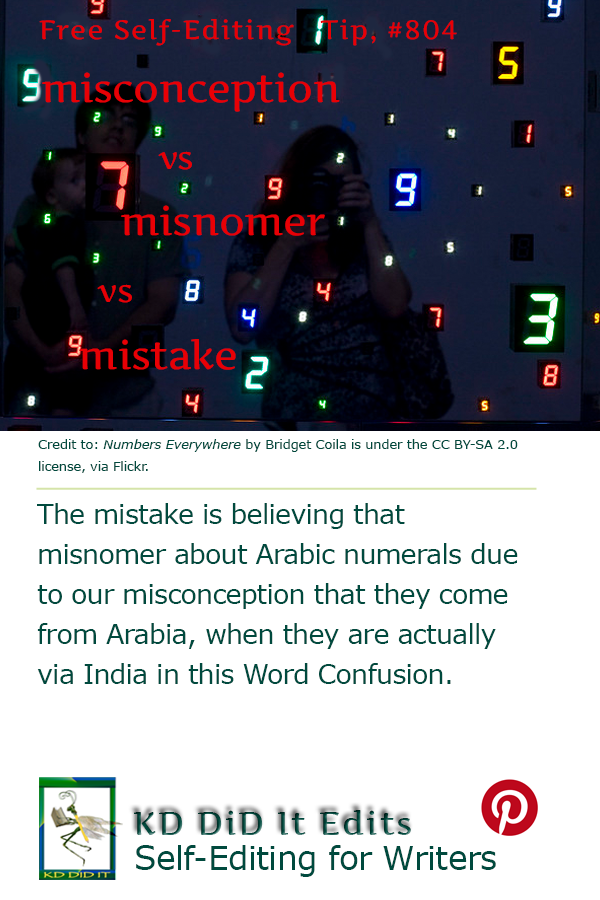Revised as of
19 Jan 2023
It’s all a mistake. One huge mistake. A mistake that can be broken down into a specific category that includes those misleading misnomers. As for those thoughtless misconceptions . . . Well, we’ll just have to give the latter some thought.
Did you know that french fries is a misnomer? That they were first invented in Belgium and should be called belgian fries? Yep, it’s one heck of a misconception, but at least it’s not a mistake, lol.
What it comes down to is that a:
- Misconception is an opinion formed from a poor understanding of the topic
- Misnomer is a particular kind of mistake in labelling
- Mistake is just generally wrong
Word Confusions . . .
. . . started as my way of dealing with a professional frustration with properly spelled words that were out of context in manuscripts I was editing as well as books I was reviewing. It evolved into a sharing of information with y’all. I’m hoping you’ll share with us words that have been a bête noire for you from either end.
If you found this post on “Misconception vs Misnomer vs Mistake” interesting, consider subscribing to KD Did It, if you’d like to track this post for future updates.
| Misconception | Misnomer | Mistake |
|---|---|---|

What If My Whole Life is a Lie? by Meme Binge is under the CC BY 2.0 license, via Flickr. — What a horrible misconception that would be! |

Scale of Justice is a derivative work modified by Producer (from <https://commons.wikimedia.org/wiki/File:Scale_of_justice_gold.jpg>) and is in the public domain, via Wikimedia Commons. — The way criminals and victims are treated these days, I’m beginning to think “justice” is a misnomer. |

The Four Capital Mistakes of Open Source by opensource.com is under the CC BY-SA 2.0 license, via Flickr. |
| Part of Grammar: | ||
| Noun
Plural: misconceptions |
Noun
Plural: misnomers |
Noun; Verb, intransitive & transitive Plural for the noun: mistakes Third person present verb: mistakes |
| Faulty thinking or understanding
A view or opinion that is incorrect because it is based on faulty thinking or understanding
|
The use of a term that is misleading
A wrong, misapplied, inappropriate, or inaccurate name or designation
|
Just plain wrong
Noun: An action or judgment that is misguided or wrong
Verb, intransitive: Verb, transitive:
|
| Examples: | ||
| There are a number of public misconceptions about antibiotic use.
There are several common misconceptions about the theory of relativity. You’re obviously under the misconception that I care about your problems. He thought that a misconception meant becoming pregnant with a girl. A lot of the original points of view were based on misconceptions about the other side’s point of view. But the idea that people oppose media intrusion is based on misconceptions that are rarely challenged. He knew everything that every one else had misconceptions about or misconstrued. Clarke is always at pains to point out errors and misconceptions in earlier writings, and he does so convincingly. |
Morning sickness is a misnomer for many women, since the nausea can occur any time during the day.
“Most other stay-at-home moms will probably agree that our job title is a misnomer. We practically live in our minivans” (Fayetteville Observer). Chinese checkers is nothing to do with China. Why do we call it a driveway when all we do is park on it? I always thought that was just a cute name . . . or a misnomer, like Pennsylvania Dutch. To call this “neighborhood policing” would be a misnomer. Unfortunately, this infamous misnomer was only the first of a series of mistakes made by the first foreigner to set eyes on the place: Hiram Bingham. In the post-modern context, however, it would be a misnomer to use family in this sense. Describing Ivan Markovic’s designs as lights is a bit of a misnomer. |
Noun: Coming here was a mistake. She made the mistake of thinking they were important. It was just a couple of spelling mistakes, jeez. It’s a bad business and no mistake. She’d left her purse at home by mistake. My mistake. Verb, intransitive: Hayfever is often mistaken for a summer cold. “You mistook when you thought I laughed at you” (Hardy). Verb, transitive: I mistook him for the mayor. She thought he’d mistaken her for someone else. There was no mistaking her sincerity. |
| Derivatives: | ||
| Adjective: misconceived Noun: misconceiver Verb: misconceive |
Adjective: mistakable, mistaken Adverb: mistakably, mistakenly Noun: mistakenness |
|
| History of the Word: | ||
| First recorded in 1655–65, as mis- + conception. | Late Middle English from the Anglo-Norman French, which is from the Old French verb mesnommer, from mes- | Late Middle English (as a verb) is from the Old Norse mistaka meaning take in error, which was probably influenced by the Old French mesprendre. |
C’mon, get it out of your system, bitch, whine, moan . . . which words are your pet peeves? Also, please note that I try to be as accurate as I can, but mistakes happen or I miss something. Email me if you find errors, so I can fix them . . . and we’ll all benefit!
Satisfy your curiosity about other Word Confusions on its homepage or more generally explore the index of self-editing posts. You may also want to explore Book Layout & Formatting Ideas, Formatting Tips, Grammar Explanations, Linguistics, Publishing Tips, the Properly Punctuated, Writing Ideas and Resources, and Working Your Website.
Resources for Misconception vs Misnomer vs Mistake
Some of these links may be affiliate links, and I will earn a small percentage, if you should buy it. It does not affect the price you pay.
Apple Dictionary.com
Dictionary.com: mistake
Fayetteville Observer. <http://www.fayobserver.com/articles/2012/10/21/1211138?sac=fo.military>.
Hardy, Thomas. The Return of the Native. Belgravia: 1878. Digireads.com: 2004. <https://amzn.to/3iShLUw>. Ebook.
Lexico.com: misnomer, misconception
Merriam-Webster: mistake
Ticak, Marko. “Misnomers.” GrammarlyBlog. n.d. Web. Accessed 5 September 2019. <https://www.grammarly.com/blog/misnomer/>.
WikiDiff: misconception
Pinterest Photo Credits:
Numbers Everywhere by Bridget Coila is under the CC BY-SA 2.0 license, via Flickr.


